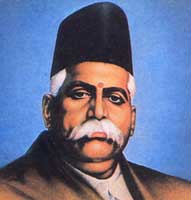|

|
Alphabetical Order
|

|
|
|
 Keshav Baliram Hedgewar's political career begins from 1905 and ends with his death in 1940. In the first phase (1905 - 1918) of his political life, he was 'an unalloyed Tilakite. After joining National Medical College in Calcutta in 1910 with the sole aim to participate in revolutionary activities, he became active member of "Anushilan Samiti" with his code name "Koken". He was closely associated with revolutionaries like Nalini Kishor Guha. After his return from Calcutta to Nagpur, he used his contacts to organise revolutionaries with a plan of "armed revolt" which, was dropped on the advice of Tilak. Hedgewar's revolutionary group was the biggest one and consisted of 150 hard core revolutionaries.
Keshav Baliram Hedgewar's political career begins from 1905 and ends with his death in 1940. In the first phase (1905 - 1918) of his political life, he was 'an unalloyed Tilakite. After joining National Medical College in Calcutta in 1910 with the sole aim to participate in revolutionary activities, he became active member of "Anushilan Samiti" with his code name "Koken". He was closely associated with revolutionaries like Nalini Kishor Guha. After his return from Calcutta to Nagpur, he used his contacts to organise revolutionaries with a plan of "armed revolt" which, was dropped on the advice of Tilak. Hedgewar's revolutionary group was the biggest one and consisted of 150 hard core revolutionaries.
The second phase of his political career began with his active participation in the Amritsar Congress in 1919 and soon he was elected the secretary of the Central Provinces Congress Committee. His differences with Tilak and Moonje came on the surface on the question of World War I and Non Co-operation Movement respectively. He refused to toe Tilak's line of "passive co-operation" during the war period (1914-1919) and separated himself from the political forum of Tilakites i.e. Rashtriya
Mandal and formed Nagpur National Union to campaign for complete Independence. Thus he foresaw the Congress resolution of complete independence in 1930. Moreover,
the most conspicuous political action of Hedgewar was his voice against both imperialism and capitalism. He moved a parallel resolution in the subject committee of Nagpur session of the Congress in 1920 stating - "the goal of the Congress is to establish
a republic in India and free the countries of the world from exploitation by capitalist countries".
His differences with Moonje who was described as his "mentor" occurred on two very important issues. Firstly, Hedgewar opposed Moonjels candidate Vijay Raghavachariar for Presidentship of the Congress in the Nagpur session of the Congress (1920) on the ground that he attended Governor's party. The differences between the two became more acute on the question of non co-operation movement. Hedgewar
refused to toe sectarian approach and jumped in the Movement with vigour and virulence and was sentenced to one year rigourous imprisonment on August 21, 1921 by the court with the remark that his defence was "more seditious than his speech".
next page >>
|




 Keshav Baliram Hedgewar's political career begins from 1905 and ends with his death in 1940. In the first phase (1905 - 1918) of his political life, he was 'an unalloyed Tilakite. After joining National Medical College in Calcutta in 1910 with the sole aim to participate in revolutionary activities, he became active member of "Anushilan Samiti" with his code name "Koken". He was closely associated with revolutionaries like Nalini Kishor Guha. After his return from Calcutta to Nagpur, he used his contacts to organise revolutionaries with a plan of "armed revolt" which, was dropped on the advice of Tilak. Hedgewar's revolutionary group was the biggest one and consisted of 150 hard core revolutionaries.
Keshav Baliram Hedgewar's political career begins from 1905 and ends with his death in 1940. In the first phase (1905 - 1918) of his political life, he was 'an unalloyed Tilakite. After joining National Medical College in Calcutta in 1910 with the sole aim to participate in revolutionary activities, he became active member of "Anushilan Samiti" with his code name "Koken". He was closely associated with revolutionaries like Nalini Kishor Guha. After his return from Calcutta to Nagpur, he used his contacts to organise revolutionaries with a plan of "armed revolt" which, was dropped on the advice of Tilak. Hedgewar's revolutionary group was the biggest one and consisted of 150 hard core revolutionaries.